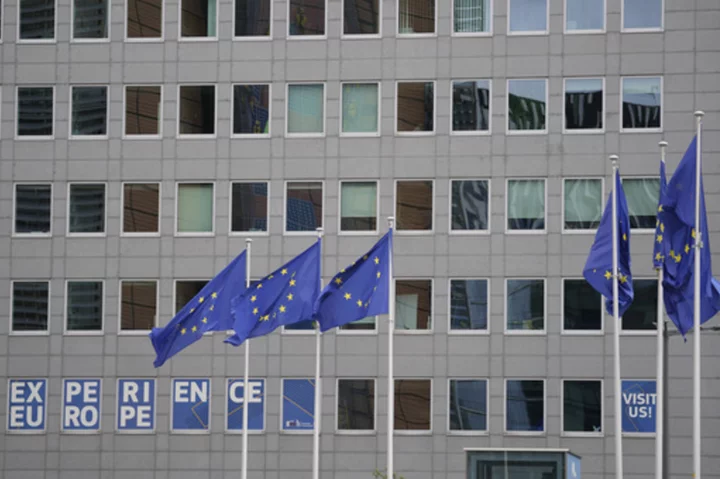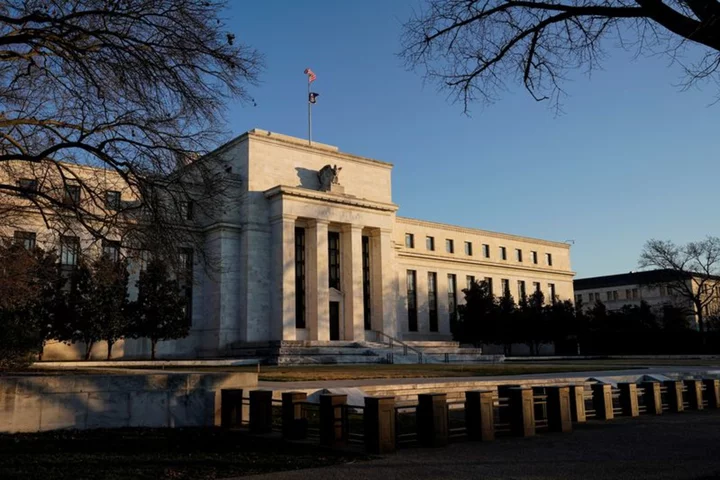By Nell Mackenzie
LONDON A fresh rout in government bonds has sparked alarm across world markets, battering equities. Yet in one corner of the hedge fund world, there's a sigh of relief.
So-called trend following and systematic hedge funds have long positioned for a fall in government bond prices given higher-for-longer inflation.
They stand out as winners from the latest bond selloff, with bond yields from the United States to Germany this week hitting multi-year highs as concern about elevated interest rates and high debt levels took hold, derailing stock markets in turn.
A Societe Generale index tracking the average performance of 20 of these funds posted a positive 2.3% performance average for this year up to Oct. 4, up from negative 4% in March of this year.
"In a post-Covid, higher-for-longer rate environment we believe the bond market needs to bottom out before equity markets stabilize," said Kathryn Kaminski, chief research strategist at AlphaSimplex in Boston.
"We need to figure out how higher rates impact longer term corporate cash flows, and the impact of higher borrowing and lending before we understand where stock markets should be."
AlphaSimplex is a $7.9 billion trend following hedge fund. These funds use computer algorithms to find where markets might move and initiate trades which jump on for the ride, up or down.
While many trend funds, also known as "managed futures" funds, use price data, their trading models might also interpret macro economic factors playing out in markets.
AlphaSimplex has been short U.S. and European government bonds for the last two years. They are not the only ones.
Six trend and systematic funds told Reuters they were short government bonds and particularly, U.S. Treasuries.
PAIN TRADE
Holding onto bets that bond prices will fall, and their yields rise, has caused much pain for this group of funds trading systematically that BarclayHedge says accounts for $352 billion of the roughly $5 billion hedge fund sector.
The failure of Silicon Valley Bank in March sent investors flying to safety, sparking the biggest three-day plunge in short dated U.S. Treasury yields since 1987.
The 172 basis point jump in two-year Treasury yields since Sept. 1 has meant a recovery for many.
The Virtus AlphaSimplex Managed Futures Strategy fund was down about 2.5% year to date as of Oct. 5, recovered from its negative 10% performance in March, according to Morningstar.
Some trend funds shrank their fixed income holdings in response to the March turmoil.
"In March, the Treasury volatility was of an order of magnitude not seen since the 1970s," said Razvan Remsing, director of investment solutions at the $8.2 billion Aspect Capital.
To manage the risk, the hedge fund's computer systems refocused its portfolio to benefit from the differences in values found in currencies and agricultural markets. The hedge fund still maintains a smaller short fixed income position.
The Aspect Diversified Fund posted a positive 6.42% for the year to the end of September.
Instead of shrinking positions, some have diversified their holdings.
Last year, AQR Capital Management more than doubled the markets traded in its classic trend strategy to include harder-to-access alternative markets, said Yao Hua Ooi, principal and co-head of macro strategies at the $100 billion hedge fund.
One of these more diversified funds, the AQR Alternative Trends Strategy, had a positive 13.1% return (net of fees) for the year as of the end of September.
"We did this in order to capture trends in more places and to be less dependent on the price action on the bigger, more widely traded markets," said Ooi.
These trading strategies have become more challenging with economies on different paths. The U.S. economy for instance remains resilient while Europe and China are weakening.
"Markets increasingly this year have moved independently from each other and this is mirrored by how we have higher dispersion among CTAs (commodity trading advisors)," said Laurent Le Saint, co-founder of Lyxor's investment partner, the $800 million hedge fund Metori Capital Management in Paris.
Metori has trades in the yen, Latin American currencies, U.S. bonds and agricultural commodities.
"This year the macro economic picture has been one of dispersions," said Aspect's Remsing.
"The U.S., UK, EU, China and Japan, as major economies, tend to set the rhythm for the rest of the world. Now these regions lack any synchronicity," he said, meaning countries which used to set the economic tone for the world as a group, face different outlooks.
(Reporting by Nell Mackenzie; editing by Dhara Ranasinghe and Susan Fenton)









